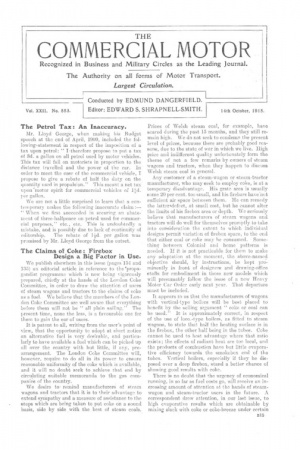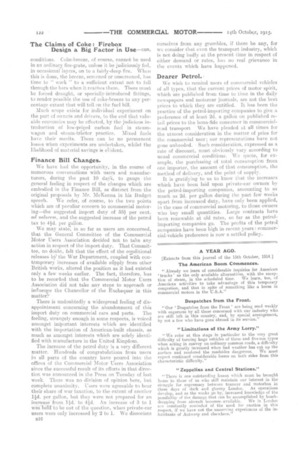The Petrol Tax : An Inaccuracy.
Page 1

Page 2

If you've noticed an error in this article please click here to report it so we can fix it.
Mr. Lloyd George, when making his Budget speech at the end of April, 1909, included the following statement in respect of the imposition of a tax upon petrol: " Ltherofore propose to put a tax of 3d. a gallon on all petrol used by motor vehicles. This tax will fall on motorists in proportion to the distance travelled and the power of the car. In order to meet the case of the commercial vehicle, I propose to give a rebate of half the duty. on, the quantity used in propulsion." This meant a net tax upon motor spirit far commercial vehicles of 1.!,d. per gallon.
We are not a little surprised to learn that a contemporary makes the following inaccurate claim:— " When we first succeeded in securing an abatement of three-halfpence on' petrolused for commercial purposes," etc., -etc. This is undoubtedly a mistake, and is possibly due to hick of continuity of editorship. The rebate of 12d. per gallon was promised by Mr. Lloyd George from the outset.
The Claims of Coke : Firebox Design a Big Factor in Use.
We publish elsewhere in this issue (pages 134 and 135) an editorial article in reference to the 'propagandist programme which is now being vigorously prepared, chiefly at the hands of the London Coke Committee, in order to draw the attention of users of steam wagons and tractors to the claims of coke as a fuel. We believe that the members of the London Coke Committee are well aware that everything before them will not be " all plain sailing." The, present time, none the less, is a favourable one for them to gain the ear of users.
It is patent to all, writing,from the user's point of view, that the opportunity to adopt at short notice an alternative fuel is very desirable, and particularly to have available a. fuel which can be picked up all over the country with hut little, if any, prearrangement. The London Coke Committee will, however, require to do all in its power to ensure reasonable uniformity of the coke which is available, and it will no doubt seek to achieve that end by circulating suitable memoranda to the gas com panies of the country. . .
We desire toremind manufacturers of steam wagons and tractors that it is to their advantage to extend synipathy and a measure of assistance to the steps which are being taken to put coke on a sound basis, side by side with the best of steam coals.. Prices of Welsh steam coal, for example, have soared during the paSt 15 months, and they still remain high.. We do not seek to condemn the present level of prices, because' there are Probably good reasons; due to the state of war in which we live. High price and. indifferent quality unfortunately form the theme of not a few remarks by owners of steam wagons and. tractors, when they happen to discuss Welsh steam coal in general.
Any customer of a steam-wagon or steam-tractor manufacturer, who May seek to employ coke, is at a temporary disadvantage. His grate area is usually some '20 per cent. too small, -and his firebars have dot sufficient air ispace between them. He can remedy the latteridefect, at small cost, but ha cannot alter the limits of his firebox area or depth. We. seriously believe that. manufacturers of steam wagons and tractors will do. well for themselves promPtly, to take into consideration the 'extent to which individual designs permit variation of 'firebox Space, to -the cud. that either coal or coke may be consumed. .Something between ,Colonial and home patterns is needed. If it is not. practicable for them to make any adaptation at -the moment, the above-named objective should, by instructions, be kept prominently in front of designers and drawing-office staffs for embodiment in those new models which will presumably follow the. issue of a new Heavy Motor Car Order early next year. That departure must be included.
It appears to us that the manufacturers of wagons with vertical-type boilers will be 'best, placed to benefit by the selling argument " coke or .coal can be used." It • is approximately correct, in respect of the use of loco–type boilers, as fitted to steam wagons, to state that half the heating surface is in the firebox, the other half being in the tubes. Coke cannot be used to best advantage where that ratio exists; the effects of radiant heat are too local, and the products of combustion have but little evaporative efficiency towards the smokebox end of the tubes. Vertical boilers, especially if they be disposed over a deep firebox, stand a better chance of showing good results with coke.
There is no doubt that the urgency of economical running, in so far as fuel costs go, will receive an increasing amount of attention at the hands of steamwagon and steam-tractor users in the future. A correspondent drew attention, in our last issue, to high evaporative results which are obtainable by mixing slack with coke or coke-breeze under certain conditions. Coke-breeze, of -course, cannot be used in an ordinary fire-grate, unless it be judiciously fed, in occasional layers, on to a fairly-deep fire. When this is done, the breeze, screened or unscreened, has time to " work " to a sufficient extent not to fall through the bars when it reaehes them. There must be forced draught, or specially-introduced fittings, to render possible the use of coke-breeze to any percentage extant that will tell on the fuel hill.
Much scope exists for individual experiment on the part of owners and drivers, to the end that valuable economies may be effected, by the judicious introduction .. of low-priced carbon fuel • in steamwagon and steam-trtictor practice. Mixed fuels have their merits. There can be no permanent losses when experiments are undertaken, whilst the likelihood of material savings is eident.
Finance Bill Changes.
We have had the opportunity, in the course of numerous conversations with users and .manufacturers, during the past 10 day-S, to gauge the general feeling in respect of the changes which are embodied in the Finance Bill, as distinct from the original proposals by Mr.. McKenna in his Budget speech. We refer, of course, to the two points which are of peculiar concern to commercial motoring—the suggested import duty of 331. per cent. ad n valorem, and the suggested increase of the petrol tax to 4id. per gallon.
• We may state, in so far as users are concerned, that the General Committee of the Commercial Motor Users Association decided not to take any action in respect of the import duty. That Committee, no doubt, felt that the effect of the conditional releases V the War Department, coupled with contemporary increases of available sipply from other British works, altered the position as it had existed only a few weeks earlier. The fact, therefore, has to be recorded that the Commercial Motor Users Association did not take any steps to approach or influence the Chancellor of the Exchequer in this matter' There is undoubtedly a widespread feeling of disappointment concerning the abandonment of this import duty on commercial cars and parts. The feeling, strangely enough in some respects, is voiced amongst important interests which are identified with the importation of American-built chassis, as much as amongst interests which are solely identified with manufacture in the United Kingdom.
The increase of the petrol duty is a very different matter. Hundreds of congratulations from users in all parts of the country have poured into the offices of the Commercial Motor Users Association since the successful result of its efforts in that direction was announced in the Press on Tuesday of last week. There was no division of opinion here, but complete unanimity. Users were agreeable to bear their share of war taxation, to the extent of another per gallon, but they were not prepared for an increase from 11c1; to 41d. An increase of 3 to 1 waS.hela-td be out of the question, when private-car users were only increased by 2 to 1. We dissociate ourselves from any grumbles, if there be any, for we consider that even the transport industry, which is not doing badly at the present time in respect of either demand or rates, has no real grievance in the events which have happened.
Dearer Petrol.
We wish. to remind users of commercial vehicles of all types, that the current prices of motor spirit, which are published from time to time in the daily newspapers and motorcar journals, are not the best prices to which they are entitled. It hasbeen the practice of the petrol-importing companies to give, a pieference of at least 2d.. a gallon on published retail prices to the bona-fide consumer in commercialread transport We have pleaded at all times for the utmost consideration in the matter of price for the commercial user; our representations have not gone unheeded. Such consideration, expressed as a rate of discount, must obviously vary according to usual commercial conditions. We quote, for example, the purchasing of total consumption from one importer, the amount of that consumption, the method of delivery, and the point of supply. , It is gratifying to us to know that the increases which have been laid upon private-car owners by the petrol-importing companies, amounting to as much as 2d. per gallon during the past few weeks apart from increased duty, have only been applied, in the case of commercial motoring, to those owners who buy small quantities. Large contracts have been renewable at old rates, so far as the petrolimporting companies go. The profits of the petrol companies have been high in recent years : commercial-vehicle preference is now a settled policy.




















